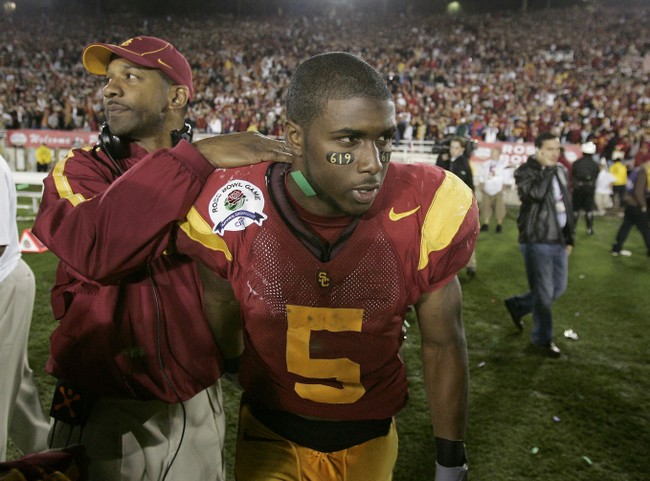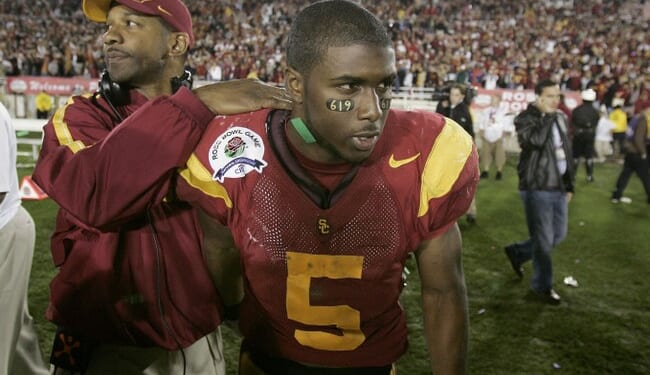
We live in an era where people judge everything in history or culture by today’s standards. We call this phenomenon “presentism,” which Oxford Languages defines as “uncritical adherence to present-day attitudes, especially the tendency to interpret past events in terms of modern values and concepts.”
It’s why we’re seeing leftists push to tear down statues and find other ways to erase inconvenient or unsavory parts of history. It’s also why we’re seeing studios and publishers censor or remake intellectual properties that run afoul of the woke.
Presentism reared its head in sports in an unusual way this week after the Heisman Trust reinstated Reggie Bush’s 2005 Heisman Trophy. Bush forfeited his award in 2010 after reports surfaced that the running back received impermissible benefits during his time at the University of Southern California.
Welcome Home!
We are reinstating the 2005 Heisman Trophy to the University of Southern California’s @ReggieBush!
In 2005, Bush gained more than 2000 yards from scrimmage and scored 18 touchdowns. He received 784 first-place votes, the fifth-most in Heisman Trophy history, while… pic.twitter.com/34oCD7P8CY
— The Heisman Trophy (@HeismanTrophy) April 24, 2024
The Heisman Trust’s motivation for giving Bush back his trophy is the emergence of name, image, and likeness (NIL) compensations for today’s college athletes. In other words, the trust looked at Bush’s past through the lens of presentism and decided that his violations of the policies in place at the time weren’t so bad after all.
“We are thrilled to welcome Reggie Bush back to the Heisman family in recognition of his collegiate accomplishments,” Michael Comerford, president of The Heisman Trophy Trust, said. “We considered the enormous changes in college athletics over the last several years in deciding that now is the right time to reinstate the Trophy for Reggie. We are so happy to welcome him back.”
Recommended: Here’s More Proof That NIL and the Transfer Portal Are Getting Way Out of Hand
“The decision to reinstate Bush’s Heisman — and return its replica to USC — comes at a time when players can now be paid for their name, image, and likeness, which was not the case when Bush emerged as a star running back for the Trojans,” explains Antonio Morales at The Athletic.
While Bush played at USC, marketers lavished cash and travel benefits on Bush and his family, and his family lived rent-free in a California home. The violations surfaced in 2006, but Bush didn’t give his Heisman back until 2010. Additionally, the NCAA vacated USC’s 2004 national championship and forced the school to disassociate itself from Bush for several years.
“Personally, I’m thrilled to reunite with my fellow Heisman winners and be a part of the storied legacy of the Heisman Trophy, and I’m honored to return to the Heisman family,” Bush told ESPN in a statement. “I also look forward to working together with the Heisman Trust to advance the values and mission of the organization.”
Look, I’m happy for Bush, but he’s not the only athlete who paid a price for benefiting from the pre-NIL era. The Athletic’s Stewart Mandel reminds us of some others, writing that “As coaches’ contracts and TV deals kept escalating, it seemed increasingly ridiculous that, for example, Georgia star Todd Gurley got suspended for four games in 2014 for accepting $3,000 to sign autographs, or that UCF kicker Donald De La Haye in 2017 lost his college eligibility for running a monetized YouTube channel.”
Teams had wins vacated because of violations. Athletes lost playing time. They weren’t as big of a media darling as Bush was, but don’t they deserve some reckoning, too? Shouldn’t others benefit from presentism and revisionist history?
Mandel points out that there may not be much that we can do:
The Heisman folks’ decision naturally opens the door to wonder what other punishments might be retroactively rescinded. There might not be any. For one thing, this was not an NCAA decision. There’s been no indication the organization plans to rescind old rulings due to the recent change in rules. And even if it could, it would be impossible to reverse SMU’s death penalty or Ohio State’s Tattoogate suspensions at this point.
All we can do is retroactively rebrand other ex-athletes who were made out to be pariahs in their day for having the audacity to take money.
The landscape of college sports is never going to be perfect, and the past few years have brought some attempts to atone for the problems of the past. But is it enough to give one award back, or do schools, conferences, and the NCAA need to do more?

